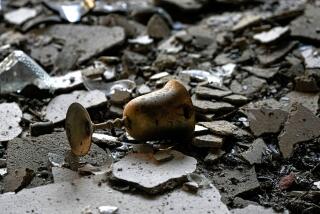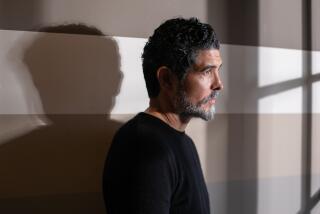After ‘Rwanda,’ drawn to Darfur
- Share via
UNITED NATIONS — The call came shortly after Don Cheadle caught the attention of the world with his Oscar-nominated performance in the 2004 movie “Hotel Rwanda.” U.S. Rep. Ed Royce, an Orange County Republican who serves on the House’s Africa Subcommittee, saw the movie about the Rwandan genocide and wanted to tell the actor that something similar was happening in the Darfur region of Sudan.
“He said that he believed the film had similar echoes and resonance to what was happening in Darfur,” recalled Cheadle, in a recent interview at the United Nations, where he and fellow actor George Clooney were lobbying on behalf of the war-torn country. “They had been unable to generate any sort of attention in the press about it. He said, ‘Perhaps you can come with us in an effort to shine light on the area.’ ”
Stars’ interest in issues can be fleeting, but for Cheadle that call was the start of a long-term commitment to Darfur.
Cheadle -- one of Hollywood’s most respected actors -- wasn’t looking for a cause at the time. He was busy with work (executive producing the Oscar-winning “Crash,” co-starring in “Ocean’s Thirteen”). But he agreed to take the trip with Royce and his congressional delegation. What he saw in Darfur -- where perhaps 200,000 people or more have been killed and another 2.5 million displaced since 2003 -- left him “outraged.”
“Whether you want to argue if it’s a genocide or not, we know that if things go unchecked it will be,” said the actor, who along with Clooney has become one of Hollywood’s most vocal advocates for the region. “We were there and saw it and smelled it and touched it and felt it.”
Cheadle and Royce visited Tine, where they saw children whose limbs had been chopped off with machetes and people who had lost their hearing in bombings. What was once a vibrant city of 400,000 had become a ghost town. Civilians fled to refugee camps, where they were left vulnerable to more attacks.
“Once you’ve seen with your own eyes what’s happening, it’s very difficult to do anything but what we’re doing, continue to advocate for some peace and security for the citizens there,” Cheadle said.
The situation in Darfur, located in the western region of Sudan, is complex: The ethnic war began in July 2003 when fighting broke out mainly between the janjaweed, an Islamic fundamentalist militia group formed by the Abbala (camel-herding Arabs), and the non-Baggara people (mostly black Muslim farmers). Under pressure, the U.N. in August approved a 17,300-member peacekeeping force for the region, but the Sudanese government -- which supports the janjaweed -- said it would consider U.N. troops “foreign invaders.”
Clooney and Cheadle, along with Olympians Joey Cheek and Tegla Loroupe, recently traveled to China and Egypt to ask that the governments use their ties with the Sudanese to help end the conflict.
Cheadle said he learned recently that their group was the highest level of delegation to travel to China and Egypt to bring awareness to the situation, a fact he found appalling.
“It’s, like, really? That’s the highest importance that this thing has held?” the actor told reporters last week.
Cheadle said he has found himself describing the Darfur situation in much the same terms his character uses in “Hotel Rwanda,” notably a scene in which Cheadle, playing hotel manager Paul Rusesabagina, tells Rwandans hiding at his hotel that they cannot rely on the U.N. peacekeepers to save them.
“There will be no rescue, no intervention force. We can only save ourselves.... Many of you know influential people abroad. You must call these people.... You must shame them into sending help.”
Last year, Cheadle updated his website to include information about Darfur, complete with links to relief agencies working in the region. He appeared in an Amnesty International public service announcement on Darfur that was later included on the “Hotel Rwanda” DVD. It generated more than $100,000 in donations, according to Bonnie Abaunza, Amnesty’s liaison to the entertainment industry.
“The response from students, activists and the public was overwhelming,” Abaunza said.
The actor has also been working on a book called “Not on Our Watch” with activist John Prendergast on the Darfur situation. Clooney and Cheadle, meanwhile, hope to make more diplomatic trips abroad.
“We want to stand up and make as much noise as possible,” he said. “Hundreds of thousands of people are dying. We can’t walk away.”
More to Read
Only good movies
Get the Indie Focus newsletter, Mark Olsen's weekly guide to the world of cinema.
You may occasionally receive promotional content from the Los Angeles Times.










